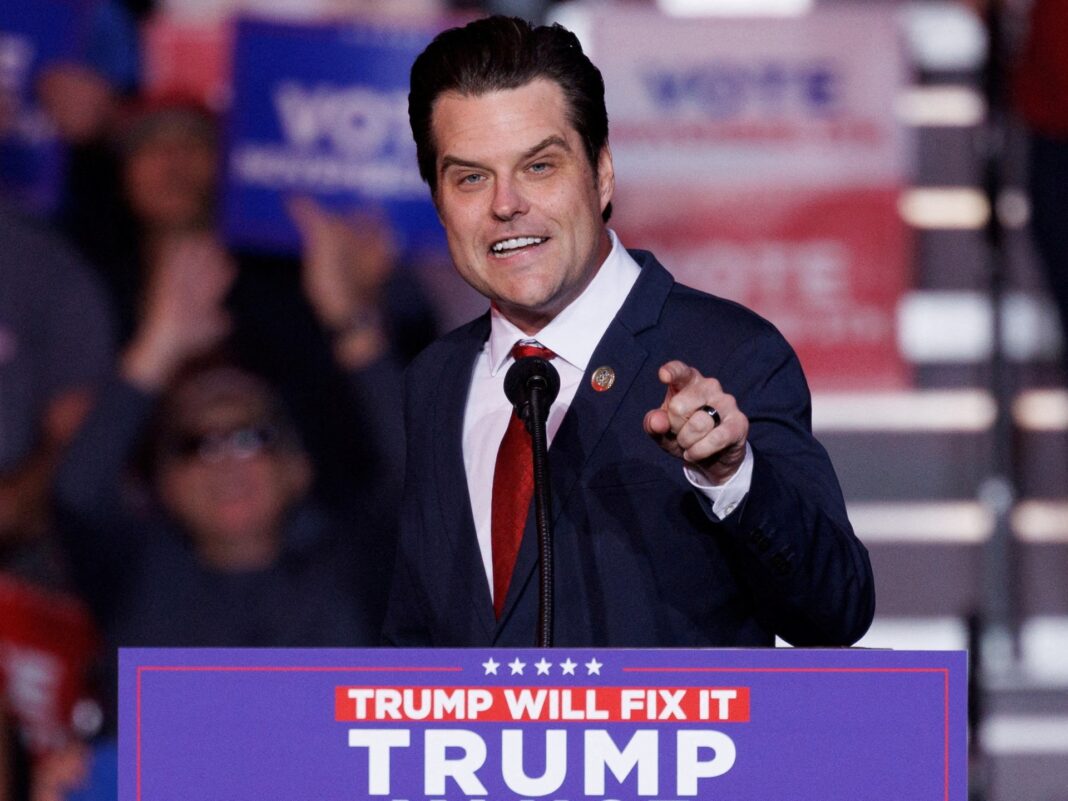Throughout his business, media and political career, Donald Trump has demonstrated a willingness to break the norm.
But the United States president-elect’s latest proposal to do away with the established processes used to appoint cabinet officials to his incoming administration poses grave risks to the rule of law in the country, experts say.
Just days after his election victory this month, Trump on November 10 invoked a provision under the US Constitution that would allow him to appoint cabinet members without Senate confirmation.
“Any Republican Senator seeking the coveted LEADERSHIP position in the United States Senate must agree to Recess Appointments (in the Senate!), without which we will not be able to get people confirmed in a timely manner,” Trump wrote on social media, prompting all three contenders for the leadership role to to quickly say they would comply.
The suggestion to use so-called “recess appointments” has sparked concern as Trump continues to roll out a list of controversial nominees to key positions within his government, including far-right firebrand Matt Gaetz as head of the US Justice Department.
Bypassing the Senate would dilute the checks-and-balances system that provides Congress with oversight over the executive branch, analysts told Al Jazeera, while effectively giving Trump even more power at a time when Republicans hold “trifecta” control of the White House, Senate and House of Representatives.
“The selection of the cabinet is the primary way in which the president exercises power,” said David Froomkin, an assistant professor at the University of Houston Law Center who specialises in administrative law.
“Eliminating the most important check on that power would massively empower the president.”
Any Republican Senator seeking the coveted LEADERSHIP position in the United States Senate must agree to Recess Appointments (in the Senate!), without which we will not be able to get people confirmed in a timely manner. Sometimes the votes can take two years, or more. This is…
— Donald J. Trump (@realDonaldTrump) November 10, 2024
A vestige of the past
But what exactly is a recess appointment?
The process dates back to the country’s early days, when the US Congress would be in recess for months at a time, usually during the summer.
When lawmakers were gone and a vacancy occurred, the US Constitution allowed the president to appoint someone without confirmation, though only through the end of the next session of Congress, explained Gabe Neville, a senior adviser at the law firm Covington & Burling, which focuses on regulatory practices.
“In the modern era, when Congress is in session most of the time, there have been some changes in how the process works and is used,” Neville said.
Lawmakers are no longer travelling by stagecoach and rail, for example, so there is no longer a need for the president to fill vacancies on an emergency basis because Congress would not be meeting for months.
But recess appointments have persisted, although not at the high-profile cabinet level.
Former presidents have used the provision mostly to fast-track the approval of federal judges — but the authority technically applies to any appointee, including top cabinet members and Supreme Court justices.
Former US President Bill Clinton made 139 recess appointments to full-time positions, for instance, and his successor George W Bush made 171. After that, President Barack Obama made 32 before a US Supreme Court decision in 2014 restricted the president’s ability to invoke the power to periods in which the Senate was in recess for at least 10 days.
Wary to give the president too much power, Congress has in the past worked around the provision by calling what’s known as “pro forma” sessions, when no real work is being done, just to stop the president from using the authority.
“So a member from Maryland or Virginia who lives close by would come in and call the House and Senate into session and then immediately adjourn for the day. But technically they’re in session that day,” Neville told Al Jazeera.
But in theory, members of Congress could also decide to go on recess precisely in order to allow the president to make recess appointments — and Neville said there is an opportunity now, with Republicans in control of Congress and Trump in the White House, for GOP lawmakers to do that.
“And we haven’t really seen that before,” he said.
Sending a message
Still, it remains unclear when — or even whether — Trump may invoke the recess appointment authority, or whether Congress would go into recess to allow him to do so.
The new Congress will start on January 3, three weeks before the presidential inauguration, and Republican senators are planning to begin hearings on Trump’s cabinet nominees immediately.
Should Trump appoint one of his nominees during a congressional recess, that person would only remain in office for the remaining duration of the two-year Congress.
But by mentioning the provision, Trump – whom critics accuse of authoritarianism – is sending a message to lawmakers, even those from his own party, that he may have little patience for their pushback.
“If the Senate goes along with Trump’s demand, it will be the first loud sound of the Constitution ripping,” Michael Waldman, president of the Brennan Center for Justice at New York University School of Law, wrote in an op-ed.
Nicholas Xenakis, a former chief counsel for late Democratic Senator Dianne Feinstein who also works at the Covington & Burling law firm, told Al Jazeera that the president-elect may also be invoking the power as “leverage”.
“Like, ‘Hey Senate, don’t make me use this power I have. Hurry up and confirm my nominees’,” he said.
“[Opposition] parties often will be very slow to confirm nominees because they don’t support the president’s agenda,” Xenakis said, adding that such situations played out during Trump’s first term as well as during Democratic President Joe Biden’s administration.
“So this may just be used as a way to push back on that,” he said.
Avoid public scrutiny
Still, with Republicans controlling the Senate, that sort of pushback is less likely, although some of Trump’s most controversial nominees, such as Gaetz, are expected to face opposition even from the GOP.
Gaetz, a former Florida congressman who resigned from the US Congress last week after Trump tapped him to lead the Justice Department, has faced a string of investigations for alleged improper and illegal behaviour.
His resignation came days before the planned release of a House Ethics Committee investigation into allegations against him that included sexual misconduct.
Froomkin at the University of Houston Law Center said Trump may be looking to recess appointments amid fears that his nominees are too extreme to be confirmed, even by a Republican-majority Senate.
The president-elect may also want to avoid the public scrutiny that comes with a confirmation process, particularly for nominees “with skeletons in their closet”, Froomkin said.
Or, Froomkin added, Trump may be invoking recess appointments to just want to be in charge. “Trump has said that he wants to be a dictator,” he told Al Jazeera. “He may simply resent the existence of checks on his power.”
Meanwhile, top Republicans so far have appeared unwilling to publicly nix the prospect of recess appointments outright.
John Thune, a Republican senator who was chosen as the chamber’s next majority leader last week, has pledged to keep “an aggressive schedule” until Trump’s nominees are confirmed and did not take recess appointments off the table.
Republican House Speaker Mike Johnson also has not ruled out the possibility of adjourning Congress to allow the president-elect to appoint cabinet members without Senate approval.
“We’ll evaluate all that at the appropriate time, and we’ll make the appropriate decision,” Johnson said in an interview with NBC News on Sunday. “There may be a function for that. We’ll have to see how it plays out.”


